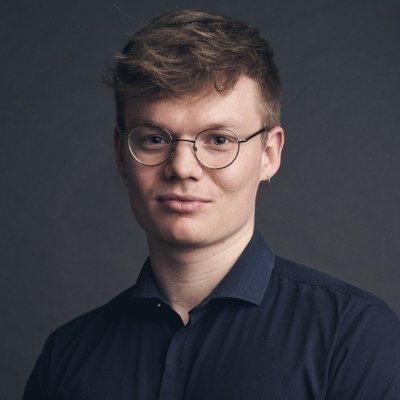Johan Sollid, Founder of Foreningen Atomkraft Ja Tak, March '24
Meet Johan, the charismatic young dane propelling Denmark’s pro-nuclear movement
At just 26 years old, Johan Sollid has taken the helm of a nascent and budding pro-nuclear movement within his native country of Denmark. Sollid chairs Foreningen Atomkraft Ja Tak (nuclear, yes please), which “dismantles misunderstandings about climate and energy based on the leading science in the field”, writes about energy, and hosts a radio show about nuclear, Radioaktiv 24syv.
Before coming to nuclear energy, Sollid focused his environmental efforts on being a vegetarian and consuming less, before realizing behavioral politics made little impact compared to energy policy like advocating for nuclear.
Sollid received a degree in political science. His first fascination with nuclear actually came through physics – with the incredible energy density of hydrogen bombs. But in a nuclear law class during his second semester, he explored the differences between Germany and the UK based on energy politics and started to research nuclear energy. Sollid said that he learned lots of climate politics were less interested in saving the climate than in a malthusian, ideological perception of humanity. After the assignment, he dove down “the (nuclear) rabbit hole.
“You cannot change the basic fundamentals of the Western world's living standard that is abundant energy all the time. And we need to keep it abundant and we need to turn it clean,” Sollid said. “So my responsibility in Denmark is to get people to understand that nuclear energy is a great way of producing electricity.”
While some tout Denmark as a green leader, Sollid said the country suffers from “impostor syndrome”, and the actual climate reality is much darker. The country has advantages for renewables - a small country with the best wind resources in the world and gets 60% of their electricity from wind and solar. But Denmark lags far behind in electrifying their energy system, with electricity only accounting for 20% of total energy use.
“It's a great country and all but we don't know shit about fucking climate politics. Like, how did people start believing that we were like front runners of the ship?,” Sollid said. “We're basically fucked everywhere else that we're doing 100% renewables because if Denmark cannot even do it yet, how should anyone else do it?”
Not only does Sollid appreciate nuclear energy for its clean energy benefits, he thinks that every grid needs it because every grid needs baseload power.
Atomkraft Ja Tak operates as a 100% volunteer organization that organizes large events about once a month. They also give presentations, essentially the case for nuclear, at schools and universities around the country. Sollid said they want to offer this information to the public, for free.
Atomkraft Ja Tak at Folkemødet 2024
Additionally, the group communicates with politicians of all political parties, acting as the go-to source for information about regulation or government policies. Sollid’s team informs them about legislation and Danish nuclear history.
Denmark had 3 research reactors and the last one closed in 2000. Sollid sees restarting a nuclear program as a path to prosperity for Denmark and a way for the country to become a leader in nuclear energy. To do this, the country needs to install the necessary regulatory bodies and institutions.
Sollid attended COP 28 in Dubai in December with fellow Atomkraft Ja Tak members Mads Bunch Larsen. During the trip, they visited Barakah nuclear plant, which delivers 25% of the nation’s electricity and 75% of the country’s clean electricity. Barakah gave Sollid both hope and dismay for Scandinavia’s clean energy future.
(Insert photo of the team)
“We could just do that (build nuclear) in Sweden, Denmark, and Norway and have a common electricity grid and share the electricity when we need it and not rely on the weather,” Sollid said.
“I think it (Barakah) gives me the hope that our energy transition is actually easier than we all think. But it's also a reminder that what is easy, is not always what gets through what gets done.”
At Kärnfull Energi DK, Sollid is the head of sales and marketing, and the company offer electricity contracts that allow customers to buy electricity certified as 100% from nuclear energy, a symbolic gesture.
Sollid hopes that if hundreds of thousands of people in Denmark start to choose to get electricity from nuclear energy, that it will incentivize companies and industries to pursue projects and put pressure on politicians.
In terms of advocacy with Atomkraft Ja Tak, Sollid said he is proud that they are successfully impacting public opinion and politicians are acting on the advice and guidance they offer.
“Making a better future for the future generations. That may be what I'm most proud of,” Sollid said.


